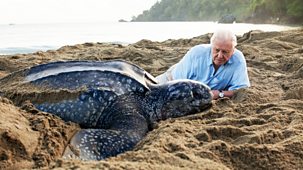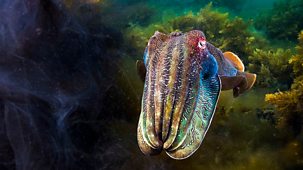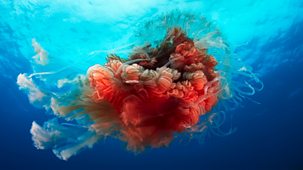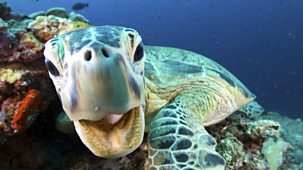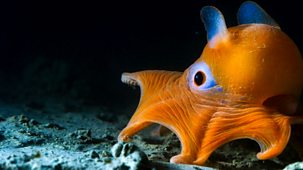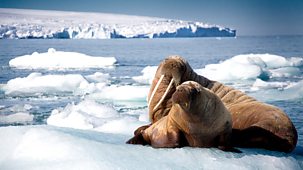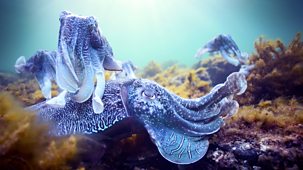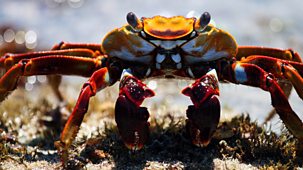
Series 1: 6. Coasts
On the coast, two worlds collide. Coasts are the most dynamic and challenging habitats in the ocean - that brings great rewards but also great danger. The extraordinary animals that live here must find ingenious ways to cope with two very different worlds.\n\nThis episode is a rollercoaster ride of heart-stopping action and epic drama, peopled with characters from the beautiful to the bizarre. We meet fish that live on dry land and puffins that must travel 60 miles or more for a single meal, and witness a life-and-death struggle in a technicolour rock pool.\n\nIn a secluded cove in the Galapagos, sea lions feast on 60kg tuna. It should be impossible - tuna are usually far too fast for sea lions to catch. But here the sea lions club together to herd their prey inshore. Once trapped in the shallows, these huge fish are easy pickings.\n\nAs the tide recedes in Brazil, lightfoot crabs leap from rock to rock, desperately avoiding the water - their lives depend on it. Moray eels launch themselves from rock pools, jaw gaping. Then octopuses, too. Both crawl across dry rock to set their ambush. Elsewhere, the ever-changing tides create rock pools. But these temporary worlds are a battleground. Predatory starfish turn a magical garden into the stuff of nightmares. \n\nAll around the world, immense waves pound the shore, and this episode reveals some of the largest on the planet, over 30 metres high. Over millennia these forces carve exquisite coastal sculptures and cliffs that are home to huge colonies of seabirds. Puffins fly up to 30 miles out to sea to find food for their chicks. A father returns with one precious beakful of food... then pirates attack. Desperate dads must escape the faster and more aerobatic skuas before finally delivering a meal to their young puffling.\n\nMeanwhile, in the remote Pacific islands lives the most terrestrial fish on the planet. It lives in miniature caves above the tide lines and uses its tail like a coiled spring to jump from rock to rock. A male tries to attract a mate, but waves are a constant hindrance. These are fish that seem to hate water!\n\nOnce a year, king penguins return to the cold Antarctic shores of South Georgia for a month-long moult. First they must cross the biggest wall of blubber on the planet - thousands of gigantic elephant seals. Then they face a month with no food, before they can return to their natural home, the chilly Antarctic seas. \n\nThe planet's coasts are changing fast as they are among the most built-up areas of the world. Just off the beaches of Miami, the largest gathering of coastal sharks on the planet can still be found. But today they must face the many challenges that come from our world too.
Source: BBC 1
Most recent episodes of Blue Planet II
Blue Planet Ii
Series 1: 7. Our Blue Planet
While making Blue Planet II, we have explored parts of the ocean that nobody has been to before, encountered extraordinary animals and discovered new insights into how life thri ...
09-03-2025
BBC 1
Blue Planet Ii
Series 1: 6. Coasts
On the coast, two worlds collide. Coasts are the most dynamic and challenging habitats in the ocean - that brings great rewards but also great danger. The extraordinary animals ...
03-03-2025
BBC 1
Blue Planet Ii
Series 1: 5. Green Seas
It's our green seas, not the blue, that bring life to our oceans. Here sunlight powers the growth of enchanted forests of kelp, mangroves and prairies of sea grass. They are the ...
28-02-2025
BBC 1
Blue Planet Ii
Series 1: 4. Big Blue
The big blue is the world's greatest wilderness, far from shore and many kilometres deep. It's a vast marine desert where there is little to eat and nowhere to hide. Yet it's ho ...
27-02-2025
BBC 1
Blue Planet Ii
Series 1: 3. Coral Reefs
Corals build themselves homes of limestone in the warm, clear, shallow seas of the tropics. Their reefs occupy less than one tenth of one per cent of the ocean floor, yet they a ...
26-02-2025
BBC 1
Blue Planet Ii
Series 1: 2. The Deep
The deep is perhaps the most hostile environment on earth, at least to us - a world of crushing pressure, brutal cold and utter darkness. We have barely begun to explore it, and ...
25-02-2025
BBC 1
Blue Planet Ii
Oceans Of Wonder
This extended special of the nature documentary series journeys from the equator to the unexplored depths, meeting the best-loved characters from the series.
21-07-2024
BBC 1
Most popular episodes of Blue Planet II
Blue Planet Ii
Series 1: 5. Green Seas
It's our green seas, not the blue, that bring life to our oceans. Here sunlight powers the growth of enchanted forests of kelp, mangroves and prairies of sea grass. They are the ...
28-02-2025
BBC 1
Blue Planet Ii
Series 1: 4. Big Blue
The big blue is the world's greatest wilderness, far from shore and many kilometres deep. It's a vast marine desert where there is little to eat and nowhere to hide. Yet it's ho ...
27-02-2025
BBC 1
Blue Planet Ii
Series 1: 2. The Deep
The deep is perhaps the most hostile environment on earth, at least to us - a world of crushing pressure, brutal cold and utter darkness. We have barely begun to explore it, and ...
25-02-2025
BBC 1
Blue Planet Ii
Oceans Of Wonder
This extended special of the nature documentary series journeys from the equator to the unexplored depths, meeting the best-loved characters from the series.
21-07-2024
BBC 1
Blue Planet Ii
Series 1: 7. Our Blue Planet
While making Blue Planet II, we have explored parts of the ocean that nobody has been to before, encountered extraordinary animals and discovered new insights into how life thri ...
09-03-2025
BBC 1
Blue Planet Ii
Series 1: 6. Coasts
On the coast, two worlds collide. Coasts are the most dynamic and challenging habitats in the ocean - that brings great rewards but also great danger. The extraordinary animals ...
03-03-2025
BBC 1
Blue Planet Ii
Series 1: 3. Coral Reefs
Corals build themselves homes of limestone in the warm, clear, shallow seas of the tropics. Their reefs occupy less than one tenth of one per cent of the ocean floor, yet they a ...
26-02-2025
BBC 1


